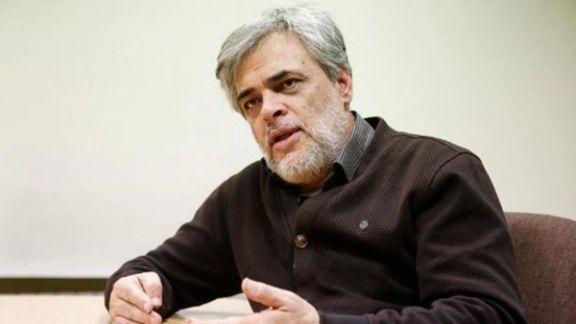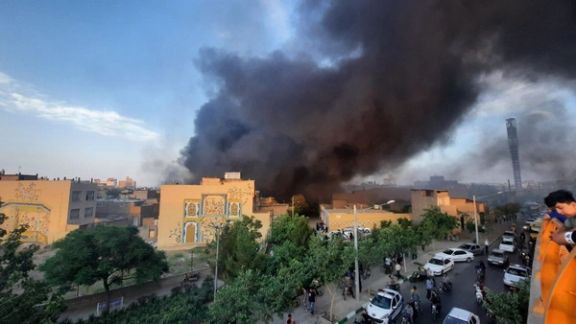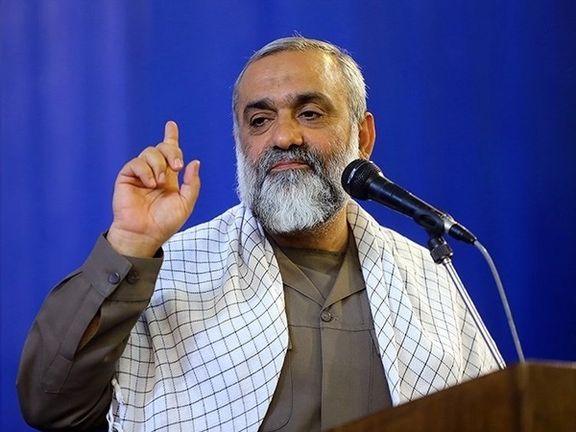Iranian Teenager Murdered By Brother In Honor Killing

A 17-year-old from Kordestan Province is the latest honor killing victim, murdered by her brother for an alleged relationship.

A 17-year-old from Kordestan Province is the latest honor killing victim, murdered by her brother for an alleged relationship.
Killed with multiple hammer blows to the head, Rozhin Azimi, was murdered on Saturday in Divandarreh, according to Hengaw Human Rights Organization.
Kurdpa news website confirmed her death saying the father and brother of Rozhin are under arrest.
On Tuesday, news websites also reported the murder of another young woman named Parastou Shahbazi who was also a victim of child marriage.
According to Hengaw and Kurdpa, Shahbazi, 18, from Dehgolan city of Kordestan province, was first hanged by her husband and then her body was stabbed.
Shahbazi's husband is allegedly addicted to drugs, but no information has been published about the motives of the murder.
Iran's Islamic Penal Code stipulates that fathers and paternal grandfathers cannot be sentenced to death for killing a child or grandchild. In such cases the perpetrator may be sentenced to prison and payment of blood money to the next of kin, that is the mother, if demanded. Mothers can also completely forgive the murderer and forego the blood money.
Perpetrators of honor killings are often not brought to justice as most families do not demand harsh punishment for them, particularly if the perpetrator is the victim’s father.
Honor killings are prevalent in some parts of Iran mostly due to societal beliefs and the Islamic Republic’s lax laws and light sentences that encourage the behavior.

US and UK navies acted when a merchant ship was being harassed by Iranian forces in the Strait of Hormuz, in a sign of a more forceful policy in the Persian Gulf.
The vessel sent a distress call on June 4 while transiting the straits, a relatively narrow waterway controlled in the north by Iran but considered international waters for commercial and naval traffic.
Iran has hundreds of fast attack boats that for years not only have harassed civilian vessels but, on many occasions, have come dangerously close to US and other warships in a show of force.
“The internationally flagged merchant vessel made a radio distress call at 4:56 p.m. local time while transiting the narrow strait. The civilian crew reported three fast-attack craft with armed personnel approached and followed the merchant vessel at close distance. The fast-attack craft were assessed to be from the Iranian Islamic Revolutionary Guard Corps Navy,” a US navy statement said.
US Navy guided-missile destroyer USS McFaul and UK Royal Navy frigate HMS Lancaster both received the distress call, and Lancaster launched a helicopter to provide surveillance. US 5th Fleet also directed a P-8A Poseidon maritime patrol aircraft to monitor the scene, the Navy said.

“The situation deescalated approximately an hour later when the merchant vessel confirmed the fast-attack craft departed the scene. The merchant ship continued transiting the Strait of Hormuz without further incident.”
It must be noted, however, that allied navies did not confront the Iranian forces, but simply "monitored" the situation. If fighter jets or attack helicopters had been dispatched, it would have sent a more forceful signal to the IRGC.
The incident followed Iran’s seizure of two commercial vessels in the Persian Gulf waters in May and an announcement by the US to send more naval forces to the region.
“[The] United States will not allow foreign or regional powers to jeopardize freedom of navigation through the Middle East waterways, including the Strait of Hormuz,” National Security Council Coordinator for Strategic Communications John Kirby told reporters on May 12, adding that there is “simply no justification” for Iranian actions to interfere, harass or attack merchant ships.
The Sunday incident also followed an announcement by the United Arab Emirates last week that it has pulled out of a US-led maritime coalition to provide security, which was later denied by the United States. However, Iran was quick to claim victory and announce that a new naval coalition is being formed with regional powers. The US also denied that claim, saying the Iranian statement “defies reason” as the Islamic Republic itself is the greatest threat to maritime security.
Sunday’s action, although not a direct naval confrontation, will reassure littoral countries that have relied on the West, and primarily on the United States, for security in the Persian Gulf.
The region contains some of the world's most important shipping routes where, in 2019, suspected Iranian attacks began against oil tankers amid tensions with the United States as the Trump administration imposed oil export sanctions on Tehran.
But Iran had long been harassing even US Navy vessels with its fast attack boat. The Obama, Trump and Biden administrations chose not to retaliate against Iranian naval provocations over the years or show a convincing military deterrent response.
As Saudi Arabia, the largest Arab power in the region shows signs of adopting a new policy of détente with Iran and close ties with China, the Biden administration feels it has to show that US security guarantees are important for the oil-rich Arab allies.
“US 5th Fleet remains vigilant and is bolstering defense around the key strait with partners to enhance regional maritime security and stability,” the US Navy said in its statement about the Sunday incident.

While the Islamic Republic’s parliament this week skipped marking the anniversary of its foundation, lawmakers continued their factional infighting in the media.
Mohammad Mohajeri, a conservative politician and a critic of the current all-conservative political establishment in Iran, wrote in a letter to parliamentary speaker Mohammad Bagher Ghalibaf: “Your criticism of the government stinks. It smells like an election campaign.”
Mohajeri was referring to Ghalibaf’s statement on Tuesday night in the Northern Khorasan Province in which he criticised President Ebrahim Raisi administration, saying, “The way the country is being run and managed is wrong.” Ghalibaf further accused the Raisi administration of wasting $104 billion a year because of mismanagement. However, he did not explain where he got the figure from.
Some observers commented that $104 is an exaggerated number, given that its twice the country’s annual budget and four times its annual oil export income.

But Ghalibaf probably tried to jump on the bandwagon of criticism, as different factions and political institutions blame each other for the current economic mess.
The parliament speaker also faces uncertainty eight months before a new election.
Mohajeri further pointed out that had a media commentator said what you stated, he would have been sent to the court for “disturbing the public opinion and levelling accusations against the government.” He would even have been accused of speaking for the enemy, Mohajeri added.
Mohajeri added: “For citizens who cannot afford buying fruits for their visiting grandchildren, $104 billion is a huge figure. They will divide it into 85 million (Iranian population) and will find out that the country’s managers have inflicted a loss of 1,223 dollars per Iranian. With that money an ordinary Iranian would have managed to buy fruits and many other things.”
“You probably know who the officials are who have wasted all that money. Why don’t you name a few of them? Are they at the parliament or in the government? And what about you? If you are one of them, why are you still in power? Do you want to waste another $104 billion next year?” Asked Mohajeri.
Mohajeri added that “the members of the government keep saying on the state TV that they are the cleanest state officials in the world. If what you said is not part of your election campaign, are you brave enough to name at least one government official” who has wasted money?
Ghalibaf had said in his speech Tuesday night: “We waste $104 billion and then we beg a foreign company to come to Iran and invest only $4 billion in our oil industry. How can we explain this to coming generations?”
Meanwhile, in a statement issued to mark the anniversary of the Islamic Republic’s Parliament (Majles) the reformist National Trust Party said: “We should pay attention to the fact that Iranians have turned their backs to the polls in the last two elections (Majles election in 2020 and presidential election in 2021). We should not remain indifferent to that”.
The statement added: “The government needs to acknowledge its mistakes and make up for what it has done wrong and try to rebuild the people’s trust in the government as the chance to reform the system will not last forever.”
The National Trust Party was referring to the barring of reformists and moderates to run for those elections by the intervention of the Guardian Council, the Supreme Leaders office and the revolutionary guards (IRGC).
Critics have said that the restrictive policy has made Iranians reluctant to take part in elections and has eroded the people’s trust in the government and parliament.

A huge fire broke out on Sunday at a home appliances' warehouse in the northeast city of Mashhad in Iran, state media reported.
"Firefighters have been dispatched from different areas of the city," the official news agency IRNA said, without giving further details.
The Mashhad fire department said no casualties had been reported, while dozens of fire fighters were still working to put out the fire, the semi-official Tasnim news agency said.
In March, another large fire broke out at three warehouses of a home appliances manufacturer in the city.
There have been a number of explosions and fires near Iran’s military, nuclear and industrial facilities in recent years.
On January 28, a huge fire erupted at an Iranian military industry factory following a suspected drone strike in the central city of Esfahan.
Iran blamed Israel for the drone attack vowing revenge.
On the same day, another large blaze also engulfed an industrial area near the city of Tabriz, northwest Iran. The government said the fire started at a refinery producing motor oil.

Banks in Iran's northern Golestan province have been urged by local officials not to provide services to women without the mandatory hijab.
Iran International has obtained a letter signed by the secretary of Golestan Province's Bank Coordination Commission addressing the managers of various banks to observe the regulation.
“No excuse is accepted by the operators in giving services (including transfer of money, deposit, and withdrawal by customers, etc.) after this correspondence, and in case of failure, they will be referred to the respected authorities,” read the letter.
Based on the instruction, inspection teams across the province will monitor the implementation of the ruling.
The new restrictions on banks also include dealing with "improper hijab of the employees", in addition to surveilling their family members.
"The activities of the children of employees in cyber space should be addressed and their parents must be given the necessary warnings,” added the letter.
Administrators of the banks should also make arrangements to separate women's workplace from men's and to prohibit the use of female secretaries.
Despite the nationwide uprising against the Islamic Republic after the killing of Mahsa Amini, the Islamic Republic has mounted pressure on women and girls to impose the mandatory hijab in recent months.
However, many Iranian women and girls challenge these efforts by appearing in public places without the compulsory dress code.
The Islamic Republic, founded in 1979, is the only Muslim country other than Taliban ruled Afghanistan with such a strict interpretation of hijab and nationwide coercive measures for its observance, while Islam is the official religion in 26 countries in Asia, sub-Saharan Africa, North Africa, and the Middle East.

The deputy commander of the Revolutionary Guards says Ali Khamenei is the ‘greatest miracle’ performed by the founder of the Islamic Republic Ruhollah Khomeini.
General Mohammad-Reza Naghdi (Naqdi) said Saturday, on the anniversary of Khomei's death in 1989 that “We thank God for the blessings he gave us, including the great blessing of the leadership of Imam Khomeini.”
He claimed that with the emergence of Khomeini he ended the rule of thousands of years of oppression, slavery.
His comments come as the Islamic Republic is considered as one of the most oppressive regimes in the world that crackdowns on dissent through increased surveillance, detention, killing, torturing, censorship.
The Iranian regime has killed more than 500 people during popular protests that started in September, after the death of Mahsa Amini in hijab police custody.
“During the Pahlavi [monarchy] rule, people were living in poverty and did not have access to facilities, but with the leadership of Khomeini and under Khamenei these people are now making satellites and submarines,” added Naqdi.
Since the 1940s Iran has launched 11 plans to build infrastructure, establish key industries, expand public services and education. Five plans were launched under the monarchy until 1979, and six during the Islamic Republic. Nevertheless, Iran is still considered a developing country.
The Islamic government, built on an anti-Western ideology engaged in hostage taking and supporting militant groups from its very inception. This kept Iran isolated from advanced economies. Inefficiency of successive clerical governments during the past four decades, and many years of international sanctions that have crippled the country's economy, were added to the adverse factors.